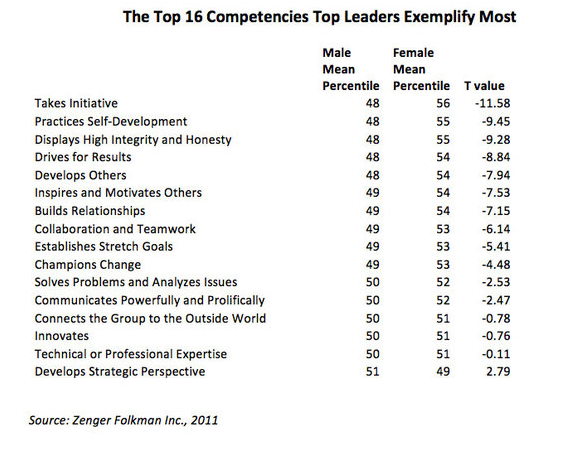by Charles Plant | Jun 6, 2013 | Leadership Development
 I’m wading carefully into this issue of women as leaders, trying not to piss anyone off. The question remains, if women make better leaders than men, why are there fewer of them in the C Suite? This is to me, a paradox of ego.
I’m wading carefully into this issue of women as leaders, trying not to piss anyone off. The question remains, if women make better leaders than men, why are there fewer of them in the C Suite? This is to me, a paradox of ego.
My own experience is that women don’t have egos the size of mens. A man’s ego will say, “I can do that” where a woman will say “Can I do that?” I know this is a gross generalization but for a well publicized example, look at Cheryl Sandberg. The author of the book, Lean In is COO of Facebook.
In an interview for The Guardian , she goes on to identify “behaviours exhibited by women in the workplace – an unwillingness to ask for more money; a tendency, in meetings, to hold back; a conservatism in estimating their self-worth – as the warping effect of historical and ongoing gender bias. Guys in her office go for promotion when they have a fraction of the necessary skills, she notes; women, by and large, wait until they have 100%. And wait to be asked, or rather, cajoled into applying.”
Cheryl’s story of her own negotiation for her compensation at Facebook is an excellent example of just that thinking at work.
This is all a function of ego. The irony is that this is one of the factors that make women better leaders. This lack of ego. It isn’t all about them so they can do a better job meeting employee needs.
So a lack of ego makes women better leaders but hinders their rise to positions of leadership. Human behaviour sure is a funny thing eh?
by Charles Plant | Jun 5, 2013 | Leadership Development
 So research says that women leaders are better than men when they are rated in 360 degree surveys but I guess the question remains: do they get better results? Rather hard to measure this yet as the takeover of the C suite by women is not yet complete. But there are two studies that I have found that are indicative.
So research says that women leaders are better than men when they are rated in 360 degree surveys but I guess the question remains: do they get better results? Rather hard to measure this yet as the takeover of the C suite by women is not yet complete. But there are two studies that I have found that are indicative.
The first study relates to women on the board of Directors and was reported on Bloomberg. “Shares of companies with a market capitalization of more than $10 billion and with women board members outperformed comparable businesses with all-male boards by 26 percent worldwide over a period of six years, according to a report by the Credit Suisse Research Institute.”
A blog on Nasdaq reported reported “Fortune 500 companies that had a woman at the helm for all of 2009 were up an average 50%.” And according to Forbes: “as a group they outperformed the overall market–companies dominated by male chief executives–by 28%, on average, and topped their respective industries by 15% [in 2010].”
So if the research is correct and women leaders are rated better and get better results, why are they better? What is it that makes women better leaders and what can we men learn from that?
by Charles Plant | Jun 4, 2013 | Leadership Development
I was surprised to receive a number of comments yesterday (from men) who were of the firm opinion that women don’t necessarily make better leaders than men. But I think thou doth protesteth too much.
I went trolling for research on the subject at the behest of one reader (female) who said there is lots of research to support the proposition that women make better leaders. According to her, there are lots of studies that show that companies with more women as directors outperform companies with fewer.
The most extensive research I uncovered comes from the Harvard Business Review. They report a study of 7280 leaders using 360 degree assessments. “At every level, women were rated by their peers, their bosses, their direct reports, and their other associates as better overall leaders than their male counterparts – and the higher the level, the wider that gap grows.”
What I found most surprising was that at all levels, women are rated higher in 12 of the 16 competencies they tested that go into outstanding leadership. In case you don’t believe me, check out the following chart:

by Charles Plant | Jun 3, 2013 | Leadership Development
 In looking at leadership scandals and the tendencies of today’s political leaders to be Narcissistic Sociopaths, it struck me, where were the women?
In looking at leadership scandals and the tendencies of today’s political leaders to be Narcissistic Sociopaths, it struck me, where were the women?
As I thought about it more, I realized that very few of the scandals that are plaguing politics in Canada, the US and Europe today are being initiated by women leaders. And what’s up with that? Women are more successful these days in breaking through the glass ceiling but then why aren’t there more scandals involving women?
Are women just more ethical than men? Are the numbers of women in leadership scandals too few or have they not been there long enough for us to notice a trend in woman initiated scandals?
Since Freud says that everything we do springs from two motives: the urge for sex and the desire to be great, one would expect that the combination of the two would result in just as many scandals involving women as men.
But that’s not the case. Scandals seem to be the virtually exclusive purview of men. While leadership isn’t only about avoiding scandals, is it perhaps that women make better leaders than men?
by Charles Plant | May 30, 2013 | Leadership Development
 Well I think I’ve learned a new term to describe leaders like Rob Ford. The term is Narcissistic Sociopath. I started the week wondering why we end up with so many leadership scandals in politics. I think now that it’s a result of the type of people who attracted to politics today. After all, who would want the current life of a politician, always in the limelight, under constant scrutiny. It would take some one with a screw loose to want that type of life.
Well I think I’ve learned a new term to describe leaders like Rob Ford. The term is Narcissistic Sociopath. I started the week wondering why we end up with so many leadership scandals in politics. I think now that it’s a result of the type of people who attracted to politics today. After all, who would want the current life of a politician, always in the limelight, under constant scrutiny. It would take some one with a screw loose to want that type of life.
Take a look at the list below and ask yourself: Is this Rob Ford? Is he a Narcissistic Sociopath? The list below includes sociopathic traits taken from the book Without Conscience: The Disturbing World of the Psychopaths Among Us by Dr. Robert D. Hare, Ph.D:
- Glib and superficial charm.
- Grandiose self-worth.
- Need for stimulation or proneness to boredom.
- Pathological lying.
- Conning and manipulative.
- Lack of remorse or guilt.
- Emotional poverty or a limited range or depth of feelings.
- Callousness and lack of empathy.
- Parasitic lifestyle.
- Poor behavioral controls.
- Promiscuous sexual behavior.
- Lack of realistic, long-term goals.
- Impulsivity.
- Irresponsibility.
- Failure to accept responsibility for own actions.
But then how can we spot them ahead of time? How can we avoid working with a Narcissistic Sociopath? How can we make sure we don’t hire them or elect them?
 I’m wading carefully into this issue of women as leaders, trying not to piss anyone off. The question remains, if women make better leaders than men, why are there fewer of them in the C Suite? This is to me, a paradox of ego.
I’m wading carefully into this issue of women as leaders, trying not to piss anyone off. The question remains, if women make better leaders than men, why are there fewer of them in the C Suite? This is to me, a paradox of ego.



